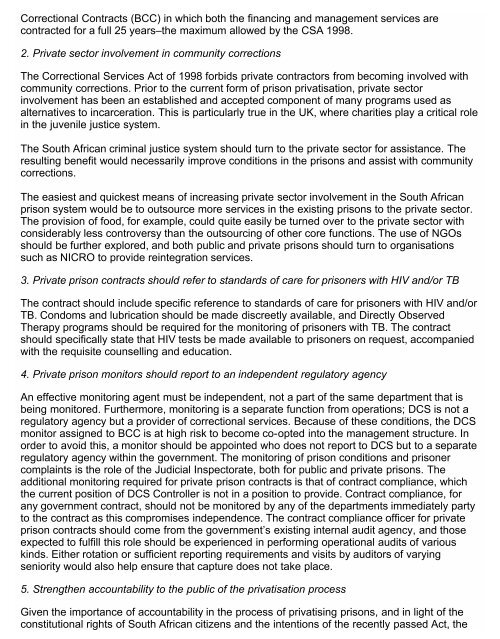prison privatisation in south africa issues, challenges and ...
prison privatisation in south africa issues, challenges and ...
prison privatisation in south africa issues, challenges and ...
You also want an ePaper? Increase the reach of your titles
YUMPU automatically turns print PDFs into web optimized ePapers that Google loves.
Correctional Contracts (BCC) <strong>in</strong> which both the f<strong>in</strong>anc<strong>in</strong>g <strong>and</strong> management services are<br />
contracted for a full 25 years–the maximum allowed by the CSA 1998.<br />
2. Private sector <strong>in</strong>volvement <strong>in</strong> community corrections<br />
The Correctional Services Act of 1998 forbids private contractors from becom<strong>in</strong>g <strong>in</strong>volved with<br />
community corrections. Prior to the current form of <strong>prison</strong> <strong>privatisation</strong>, private sector<br />
<strong>in</strong>volvement has been an established <strong>and</strong> accepted component of many programs used as<br />
alternatives to <strong>in</strong>carceration. This is particularly true <strong>in</strong> the UK, where charities play a critical role<br />
<strong>in</strong> the juvenile justice system.<br />
The South African crim<strong>in</strong>al justice system should turn to the private sector for assistance. The<br />
result<strong>in</strong>g benefit would necessarily improve conditions <strong>in</strong> the <strong>prison</strong>s <strong>and</strong> assist with community<br />
corrections.<br />
The easiest <strong>and</strong> quickest means of <strong>in</strong>creas<strong>in</strong>g private sector <strong>in</strong>volvement <strong>in</strong> the South African<br />
<strong>prison</strong> system would be to outsource more services <strong>in</strong> the exist<strong>in</strong>g <strong>prison</strong>s to the private sector.<br />
The provision of food, for example, could quite easily be turned over to the private sector with<br />
considerably less controversy than the outsourc<strong>in</strong>g of other core functions. The use of NGOs<br />
should be further explored, <strong>and</strong> both public <strong>and</strong> private <strong>prison</strong>s should turn to organisations<br />
such as NICRO to provide re<strong>in</strong>tegration services.<br />
3. Private <strong>prison</strong> contracts should refer to st<strong>and</strong>ards of care for <strong>prison</strong>ers with HIV <strong>and</strong>/or TB<br />
The contract should <strong>in</strong>clude specific reference to st<strong>and</strong>ards of care for <strong>prison</strong>ers with HIV <strong>and</strong>/or<br />
TB. Condoms <strong>and</strong> lubrication should be made discreetly available, <strong>and</strong> Directly Observed<br />
Therapy programs should be required for the monitor<strong>in</strong>g of <strong>prison</strong>ers with TB. The contract<br />
should specifically state that HIV tests be made available to <strong>prison</strong>ers on request, accompanied<br />
with the requisite counsell<strong>in</strong>g <strong>and</strong> education.<br />
4. Private <strong>prison</strong> monitors should report to an <strong>in</strong>dependent regulatory agency<br />
An effective monitor<strong>in</strong>g agent must be <strong>in</strong>dependent, not a part of the same department that is<br />
be<strong>in</strong>g monitored. Furthermore, monitor<strong>in</strong>g is a separate function from operations; DCS is not a<br />
regulatory agency but a provider of correctional services. Because of these conditions, the DCS<br />
monitor assigned to BCC is at high risk to become co-opted <strong>in</strong>to the management structure. In<br />
order to avoid this, a monitor should be appo<strong>in</strong>ted who does not report to DCS but to a separate<br />
regulatory agency with<strong>in</strong> the government. The monitor<strong>in</strong>g of <strong>prison</strong> conditions <strong>and</strong> <strong>prison</strong>er<br />
compla<strong>in</strong>ts is the role of the Judicial Inspectorate, both for public <strong>and</strong> private <strong>prison</strong>s. The<br />
additional monitor<strong>in</strong>g required for private <strong>prison</strong> contracts is that of contract compliance, which<br />
the current position of DCS Controller is not <strong>in</strong> a position to provide. Contract compliance, for<br />
any government contract, should not be monitored by any of the departments immediately party<br />
to the contract as this compromises <strong>in</strong>dependence. The contract compliance officer for private<br />
<strong>prison</strong> contracts should come from the government’s exist<strong>in</strong>g <strong>in</strong>ternal audit agency, <strong>and</strong> those<br />
expected to fulfill this role should be experienced <strong>in</strong> perform<strong>in</strong>g operational audits of various<br />
k<strong>in</strong>ds. Either rotation or sufficient report<strong>in</strong>g requirements <strong>and</strong> visits by auditors of vary<strong>in</strong>g<br />
seniority would also help ensure that capture does not take place.<br />
5. Strengthen accountability to the public of the <strong>privatisation</strong> process<br />
Given the importance of accountability <strong>in</strong> the process of privatis<strong>in</strong>g <strong>prison</strong>s, <strong>and</strong> <strong>in</strong> light of the<br />
constitutional rights of South African citizens <strong>and</strong> the <strong>in</strong>tentions of the recently passed Act, the
















